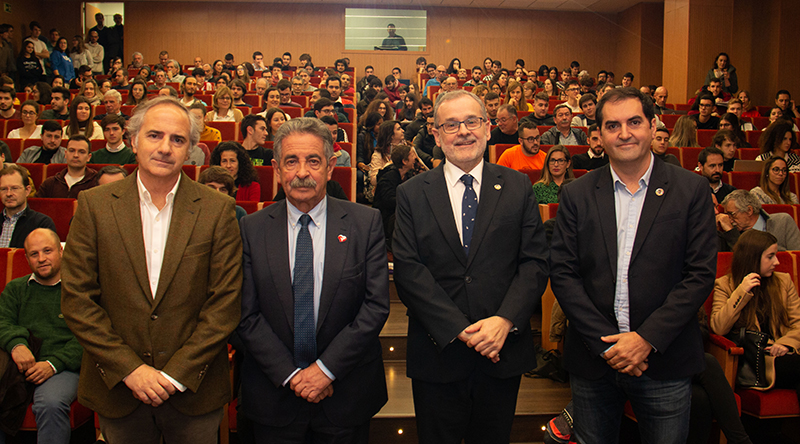
12 December 2019
IFCA Director José Manuel Gutiérrez has advanced that an agreement is being negotiated with the bureau of the IPCC so that Spain is included as a fourth group of data support through the Institute of Physics of the University of Cantabria
The rector of the University of Cantabria (UC), Ángel Pazos Carro, accompanied by the president of Cantabria, Miguel Ángel Revilla, has presented the conference 'Current situation and perspectives on climate change in Cantabria', which is the last of the activities that the regional government, the University of Cantabria (UC) and the Institute of Environmental Hydraulics of Cantabria (IHCantabria) have jointly organized on the occasion of the COP25 Climate Change Summit that is being held these days in Madrid.
Our director and head of the Meteorology and Climate Change Research Group, José Manuel Gutiérrez, has advanced the news of the sixth IPCC report, "which is in process and whose information is preliminary and confidential", as well as Cantabria's contribution in its elaboration that is "quite relevant".
From the point of view of Working Group I, of which the researcher is a part, the most relevant results of the report are the projected maps for the future of increments of the basic variables in the near, medium and distant future.
The sixth report will collect for the first time a block of chapters that speaks of regional aspects, in which other variables will be looked at, in addition to precipitation and temperature, such as drought, aridity and other relevant indices for impact studies.
The IFCA director has announced that a special working group has been established within the IPCC to promote reproducibility so that interactive atlas that is being developed constitutes the "flagship" that Working Group I is using with the objective to disseminate and carry out this activity throughout the report, which means that "the role and contribution of Cantabria in the next report is the most important that Spain has had so far in the IPCC".
Gutierrez has also pointed out that there are currently data support centers in the IPCC in Germany, the United Kingdom and NASA in the US. and has affirmed that "an agreement is being negotiated with the IPCC bureau so that Spain is included as the fourth support group through the IFCA", which, according to the researcher, would allow consolidating the entire IFCA computing structure as well as that of climate data services covered by the Department of Applied Mathematics of the School of Roads of the University of Cantabria, collaborating redundantly with the Data Processing Center (CPD) of the Faculty of Science.
For his part, Íñigo Losada, research director of IHCantabria and responsible for the area of Climate, Energy and Marine Infrastructure, has reviewed his experience when working at the IPCC as well as its structure, and stressed that the current indicators are not optimistic, since, for Losada, "that this process continues depends on what the emissions scenario is and when it begins to mitigate." In this regard, he pointed out that there is a direct relationship between "our emissions and the increase in the frequency, intensity, and importance of the damage", which for Professor Losada, "has very important implications".
In the specific case of Cantabria, Losada has pointed out that, in the environment of the year 2045, "the events that now happen with 100 years of return period would happen annually", and recalled that in the evaluation that they made in IHCantabria about the events In 2014, a return period of 30/35 years was estimated, which gives an idea of the repercussions in the case that "it is not adequately mitigated".
The day has also had the assistance of the vice-chancellor of campus, Services, and Sustainability of the UC, Mario Mañana; the counselor Rural Development, Livestock, Fisheries, Food and Environment, Guillermo Blanco; and the director of the School of Roads, José Luis Moura, among others.
